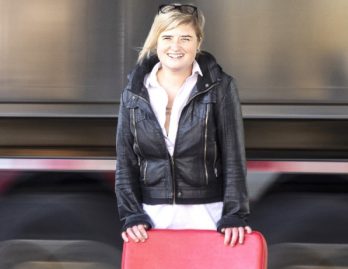“To sit down and have somebody look at me and talk to me like a person and not just an illness,
她說:“坐下來,有人看著我,像對待一個人一樣對待我,而不是像對待一個病人,
it helped me feel cared about and less alone,” she says.
這讓我感到有人關心我,也讓我少了一些孤獨。”
After that, Steller knew she wanted to have her own salon so she could help people feel the way she’d felt that day.
從那以后,斯特勒知道她想要擁有自己的發(fā)廊,這樣她就可以幫助人們獲得她那天的感受。
Not long after finishing cosmetology school in 2009, she began what she now calls her Red Chair Project, reaching out to people on the streets.
2009年從美容學校畢業(yè)后不久,她開始了現(xiàn)在被她稱為“紅椅”的項目,向街上的人們伸出援手。
“Part of what broke my heart was just how lonely people looked,” she says.
他說,“讓我心碎的部分原因是人們看起來很孤獨。”
“I thought maybe I’d go around and ask if people want free haircuts.
“我想也許我應該去問問有沒有人想要免費理發(fā)。
I can’t fix their problems, but maybe I can help them feel less alone for a moment.”
我無法解決他們的問題,但或許我可以幫助他們暫時不那么孤獨。”
Steller listens to people’s stories of loss, addiction, and struggle to get back on their feet.
斯特勒聽人們講述失去、成癮、掙扎著重新站起來的故事。
The attention apparently works. When she was cutting a woman’s hair one day, someone drove by and yelled, “You look amazing!
顯然,這種關心是有用的。有一天,她給一名女性理發(fā),有人開車過去時喊道,“你看起來很棒!
The woman in the chair beamed. “I’m not invisible,” she exclaimed.
坐在椅子上的女人微笑著。“我不是隱形的,”她喊道。
“I thought I was invisible. Look, people see me!”
“我以為我是隱形的。看,人們看到我了!”
Another man was on his way to a job interview at a pet-supply store when he accepted Steller’s offer.
另一名男子在去一家寵物用品商店面試的路上接受了斯特勒的邀請。
When she followed up, she learned he didn’t get that job, but he did get a landscaping job soon afterward.
當她繼續(xù)跟進時,她發(fā)現(xiàn)他沒有得到那份工作,但他很快就得到了一份景觀美化的工作。

An offshoot of the Red Chair Project is the Steller Kindness Project,
紅椅項目的一個分支是斯特勒善良項目,
in which people who commit acts of kindness (volunteering for hurricane relief, helping neighbors in need) are invited for a free makeover at Steller’s salon.
在這個項目中,那些做善事的人(志愿參加颶風救援,幫助有需要的鄰居)會被邀請參加斯特勒沙龍的免費改型活動。
In exchange, they tell their stories, which Steller shares on her website.
作為交換,他們會講述他們的故事,然后斯特勒就在她的網(wǎng)站上分享出去。
Her hope is that by reading about kind acts, others will be inspired to spread their own.
她希望通過閱讀有關善舉的書籍,能夠激勵其他人傳播自己的善意。
So far, it’s working, she says. “I’ve had people reach out from around the country, saying, ‘I’m going to shelters and cutting hair.’
她說,到目前為止,這是有用的。“全國各地的人都來找我,說‘我要去避難所剪頭發(fā)。’
Or, ‘I’ve driven by this woman for the past two years, and I’ve never stopped to say hi.
或者,過去兩年,我都開車經(jīng)過這個女人,我從未停下來打招呼。
Now I say hi to her every time I drive by.’” And it all began with a belief in simple acts of kindness, such as a free haircut.
現(xiàn)在我每天經(jīng)過她時都打招呼。”這一切都始于一個簡單的善舉,比如免費理發(fā)。
“The way you show up in the world matters,” says Steller.
你在世界上的表現(xiàn)很重要,”斯特勒說。
“You have no idea what people are going to do with the kindness that you give them.”
你不知道人們接受你的善良后會去做什么。”


